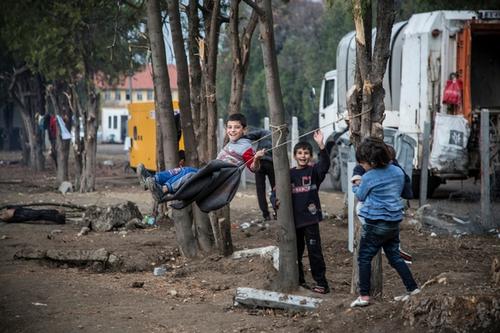An Interview with Carla Peruzzo, medical coordinator, MSF Bulgaria
This year, nearly 10,000 migrants and refugees, the majority from Syria, have arrived in Bulgaria. The unexpected influx has put pressure on the Bulgarian authorities’ capacity to provide proper shelter and health care. Significant improvements are still needed in preparation for the coming winter. As the war in Syria rages and access to Europe for refugees fleeing the conflict has become increasingly difficult, more and more people end up in Bulgaria seeking refuge. After observing terrible living conditions in reception centres in the Bulgarian capital Sofia, and in makeshift camps in the southern part of the country, Médecins Sans Frontierès (MSF) began providing medical care in the worst affected camps.
Carla Peruzzo, MSF’s medical coordinator in Bulgaria, describes the situation:
Overcrowded camps
“People are living in overcrowded camps and the facilities are ill-equipped to cope with the huge number of migrants and refugees. A lot needs to be done to prepare for the winter, which is already upon us. The buildings are old and need restoration, showers and toilets are few and access to hot water and cooking facilities is extremely limited.
The Bulgarian authorities are engaged in a concerted effort to complete the renovation of the centres that are set up in old disused buildings and they are in the process of removing the tents with containers for people to live in. But it is a challenge for them to keep up with what needs to be done. Their resources are being stretched. It is not a wealthy country and doctors and nurses are poorly paid. The few that are able work with MSF in the little free time they have.
Fear of severe pneumonia
The overcrowded centres and the very poor hygiene conditions, including a lack of toilets and showers, mean we see illnesses such as skin infections, eye infections and diarrhea. We fear that we are going to see a lot of severe pneumonia cases when the winter really sets in. It is very difficult for people to maintain good quality personal hygiene, and it is also hard for them to keep warm. At night the temperature can drop to minus 10oC or lower. So we try to improve what we can and inform people about how to maintain personal hygiene in these conditions.
We also see some patients with more complex needs. For instance there is a 17 year old girl here with a rare cardiac heart condition. The only real possible treatment is a heart transplant, which is impossible for MSF to provide. It is a very difficult case. At the moment she is on a very expensive medication that she can’t afford, so we provide that. But she can’t survive in this camp, so we try to put together her medical file and ask that she is considered as a highly vulnerable person in need of special attention by the UN refugee agency.
Psychological support needed
We also see that people are extremely stressed and need psychological support as well. They have fled from war and now they fear that they probably won’t be able to return to their homes. They have lost everything. So we see people coming to us with symptoms and asking for care even though they are physically healthy. Today a woman came to us three times with different problems and at the end she just broke down. They’re looking for some reassurance that somebody will take care of them. This is why our team will soon include a psychologist in order to respond to these needs.
We came to Bulgaria at the right moment. It’s essential that everyone in the camps has access to the medical care that they need. The Bulgarian authorities are putting in a good effort to improve the conditions, but still much more needs to be done to ensure the necessary minimum standards in terms of living conditions.”



